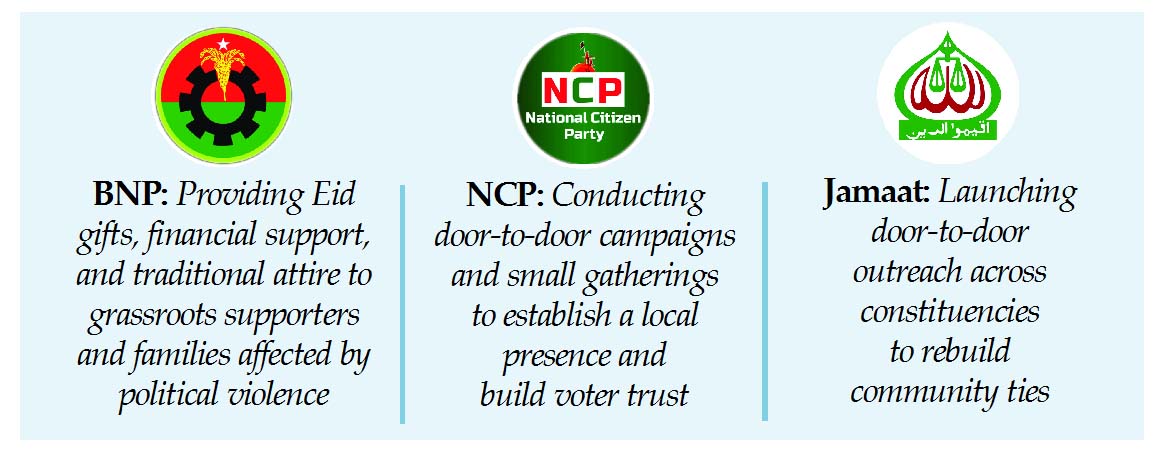Pol parties leverage Eid for election outreach

Abu Jakir :
In the wake of a significant shift in the country’s political landscape, three major political parties – Bangladesh Nationalist Party (BNP), Bangladesh Jamaat-e-Islami, and the newly formed National Citizen Party (NCP) – have launched extensive grassroots campaigns during the country’s largest religious festival.
In fact, after a decade, Bangladesh is going to celebrate Eid-ul-Fitr in a more open and democratic atmosphere.
With the fall of the Awami League government following last year’s student-led uprising, political actors now operate without restrictions, enabling them to reconnect with their constituencies.
Eid has become a crucial moment for these parties, as leaders intensify their engagement through social programmes, including iftar gatherings, street meetings, and community discussions.
Prospective parliamentary candidates are seizing the opportunity to reach voters without fear of intimidation-an unprecedented development after more than a decade of political suppression.
For the first time in nearly six years, BNP is engaging openly with grassroots supporters. The party’s central leadership has issued directives to strengthen BNP’s public image through Eid-related activities.
Senior Joint Secretary General Ruhul Kabir Rizvi highlighted the significance of this political shift, stating: “After a long struggle, the people of the country will celebrate Eid-ul-Fitr in a different atmosphere this time. Our message is clear: BNP leaders and activists should celebrate peacefully, stay close to the public, and exercise caution in their words and actions ahead of the 13th parliamentary election.”
BNP leaders, many of whom were previously imprisoned or exiled, are embracing the opportunity to reconnect with their bases.
Sultan Salahuddin Tuku, BNP’s Central Publicity Secretary, who spent four years in prison under the Awami League regime, remarked on the changed political conditions: “Previously, I was either behind bars or on the run during Eid. Now, I am making up for lost time by working day and night to serve our supporters.”
BNP’s Acting Chairman Tarique Rahman has also mobilised party activists to distribute Eid gifts to grassroots supporters, media personnel, and diplomats.
Special teams have been sent to visit the families of those who suffered enforced disappearances and political violence, delivering traditional Eid attire and financial support.
The newly formed National Citizen Party (NCP) is also using Eid to establish its grassroots presence. Key party figures have travelled to their constituencies, prioritising door-to-door campaigns and small gatherings over large rallies.
Sarjis Alam, NCP’s Chief Organiser (North), made a notable political statement with his grand arrival in Panchagarh, where he plans to contest the upcoming elections. His motorcade procession attracted significant attention, symbolising his return to his ancestral political stronghold.
“Whenever we visited people, they spoke to us spontaneously. We discussed their expectations from the new party and various local concerns,” he told reporters.
In Rangpur, NCP Member Secretary Akhter Hossen has launched an active campaign, deploying over 200 vans to engage with voters across key areas. His strategy of direct engagement reflects NCP’s intent to build a robust grassroots foundation ahead of the election.
Jamaat-e-Islami, under clear directives from its leadership, has also intensified its grassroots engagement. Secretary General Mia Golam Parwar confirmed that the party had initiated outreach efforts immediately after the fall of the Awami League government.
“Our leaders will conduct door-to-door campaigns in their respective constituencies surrounding Eid-ul-Fitr,” he stated, emphasising the party’s renewed confidence in operating without restrictions.
As Bangladesh prepares for its next general election – expected by June next year under the Nobel Laureate-led interim government – political parties are seizing the opportunity to re-establish their presence.
This Eid marks a turning point in the country’s political landscape, offering the opposition the freedom to engage openly with voters and shape the future of Bangladesh’s democracy.
